VATICAN CITY (CNS) – God’s laws are meant to lead all people to Christ and his glory, and if they do not, then they are obsolete, Pope Francis said in a morning homily.
In fact, the scholars of the law in Jesus’ day were so wrapped up in doctrine as an end in itself, they were unable to see that Jesus was leading people down a new and surprising path toward his glory, the pope said Oct. 13 during his morning Mass in the Domus Sanctae Marthae, where he lives.
Jesus did “strange things,” like “walk with sinners, eat with tax collectors” – things the scholars of the law “did not like; doctrine was in danger, that doctrine of the law” that they and the “theologians had created over the centuries,” he said, according to Vatican Radio.
The scholars were safeguarding the law “out of love, to be faithful to God,” the pope said, but “they were closed up right there,” and forgot all the ways God has acted in history.
“They forgot that God is the God of the law, but is also the God of surprises,” he said.
“God is always new; he never denies himself, he never says that what he had said is wrong, but he always surprises us,” the pope said.
The scholars of the law had forgotten how many times God surprised his people, like when he freed them from slavery in Egypt, he said. They were too wrapped up in their perfect system of laws – “a masterpiece” where everyone knew exactly what he or she was supposed to do; “it was all settled. And they felt very secure there,” he said.
They couldn’t see beyond “this system made with lots of good will,” and they could not read the “signs of the times,” the pope said.
They couldn’t see that what Jesus was doing was a sign indicating “that the time was ripe,” he said. This is why in the day’s Gospel reading (Lk 11:29-32) Jesus said, “This generation is an evil generation,” because it sought the wrong kind of sign, the pope said.
The scholars of the law also forgot that the people of God are a people on a journey, “and when you journey, you always find new things – things you never knew before,” he said. But the journey, like the law, is not an end in itself; they are a path, “a pedagogy,” toward “the ultimate manifestation of the Lord. Life is a journey toward the fullness of Jesus Christ, when he will come again.”
The law teaches the way to Christ, and “if the law does not lead to Jesus Christ,” he said, “and if it doesn’t get us closer to Jesus Christ, it is dead.”
Pope Francis asked people to reflect, “Am I attached to my things, my ideas. Am I closed?”
“Am I at a standstill or am I a person on a journey? Do I believe in Jesus Christ, in what Jesus did,” dying for humanity’s sins and rising again? he asked.
“Am I able to understand the signs of the times and be faithful to the voice of the Lord that is manifested in them?” he asked.
Pope Francis urged people to pray to be able to walk “toward maturity, toward the manifestation of the glory of the Lord” and to have a heart “that loves the law, because the law is God’s.”
But may people also be able to “love God’s surprises and to know that this holy law is not an end in itself,” he said.
(Copyright © 2014 Catholic News Service/United States Conference of Catholic Bishops. The CNS news services may not be published, broadcast, rewritten or otherwise distributed, including but not limited to, such means as framing or any other digital copying or distribution method in whole or in part, without prior written authority of Catholic News Service.)
(Editor’s note: in future issues of Mississippi Catholic look for reflections and excerpts from Pope Francis’ apostolic exhortation, “The Joy of the Gospel ,”in this space.)
Category Archives: World News
Pope to bishops: Guard the faith, build hope
By Carol Glatz
VATICAN CITY (CNS) – Today’s bishops must be as vigilant and courageous as sentinels keeping watch over the faith, and as forgiving and patient as Moses, leading a sinning people across harsh deserts to God, Pope Francis said.
Their vocation is not to be wardens of a failed estate, “but custodians of ‘evangelii gaudium’ (the joy of the Gospel); therefore, you cannot be without the only treasure we really have to give, and that the world cannot give itself: the joy of God’s love,” he told new bishops.
The pope made his comments Sept. 18 in a written address to 138 recently appointed bishops from around the world, including Bishop Jospeh Kopacz, 13 other bishops from the United States and two from Australia. The pope said he was happy finally to put a real face to their names and resumes, which he told them he was closely familiar with.
In a lengthy address, Pope Francis outlined a series of do’s and don’ts in their new role as bishops, reminding them of their true mission and urging them to return home “with a message of encouragement” even with the problems awaiting them.
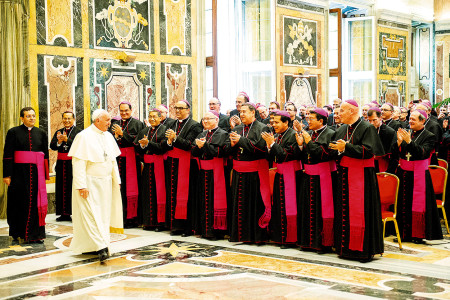
Pope Francis arrives for a meeting with 138 new bishops from around the world at the Vatican Sept. 18. Bishop Kopacz attended the meeting. (CNS photo/L’Osservatore Romano)
Their approach must always be positive, he said, especially with each other. “Though jealously safeguarding the passion for truth, do not waste your energy in opposition and arguments, but in building and loving,” he said.
The bishops must strike a balance between being audacious sentinels, ready 24/7 to wake up a slumbering world, and gentle, forgiving fathers who unconditionally love the sinning people “God has given you.”
The only way to fulfill this mission, he said, is to be constantly in search of and completely bound to Christ, which takes “familiarity, dedication, perseverance and patience.”
“It’s necessary to always dwell in him and never run away from him: Dwell in his word, in his Eucharist, in the things of his father and, above all, in his cross,” he said.
Just as a flame is always kept lit in front of every tabernacle to tell the faithful that Christ is present inside, every priest, too, needs to have the light of Christ shining in his gaze so the flock can “encounter the flame of the risen one.”
That is why the church cannot have bishops who are “switched off or pessimists” or who rely only on themselves and have “surrendered to the darkness of the world or resigned to the apparent defeat of the good, screaming – at this point, in vain – that the tiny fort has been attacked,” he said.
But they do have to be like sentinels, he said, “capable of waking up your churches, getting up before dawn or in the middle of the night to bolster the faith, hope and charity, without letting yourselves be lulled to sleep or conforming to the nostalgic complaint of a golden past that’s already gone.”
“Don’t be bishops with an expiration date,” who are always on the lookout for a new assignment somewhere else, or “like a medicine that will stop being effective or like perishable food to be thrown out,” he said.
Like Moses, bishops need to be with their people no matter what, he said.
“I also beg you to not let yourselves be deceived by the temptation to change the people. Love the people that God has given you, even when they will have committed great sins.”
Like Moses, the bishop must “come up to the Lord” and advocate on his people’s behalf, praying for forgiveness and a fresh start, he said.
“I am well aware of how our times have become a desert,” he said. And that’s why the people need someone who will patiently guide them and help them mature, and who will not “fear death as exiles, but deplete your last energies, not for yourselves, but to let those you guide enter into God.”
Nothing is more important than bringing people to God, he said. The pope urged the bishops to truly be present and available for their priests.
A bishop who is “reachable” isn’t the one who has endless means of communication at his disposal. He’s the one who always has room in his heart to really welcome and listen to all of his priests and their “concrete needs, giving them the entirety and breadth of church teaching and not a list of complaints.”
“And, please, do not fall into the temptation of sacrificing your freedom by surrounding yourself with courtiers, climbers and yes-men, since the church and the world have the right to always find on the lips of the bishop the Gospel, which makes them free.
(Copyright © 2014 Catholic News Service/United States Conference of Catholic Bishops. The CNS news services may not be published, broadcast, rewritten or otherwise distributed, including but not limited to, such means as framing or any other digital copying or distribution method in whole or in part, without prior written authority of Catholic News Service.)
Brookhaven pastor seeks assistance for homeland
BROOKHAVEN – Father Alphonse Arulanandu, pastor of St. Francis of Assisi Parish, is asking for help for the people of his homeland who are facing a natural disaster familiar to many in Mississippi, severe flooding.
Father Arulanandu is from the Catholic diocese of Jammu-Srinagar. The diocese has missions in all three regions flooded right now – Jammu, Kashmir and Ladakh. His bishop, Bishop Peter Celestine, sent a letter detailing the damage and asking the priests from his diocese serving abroad for help.
“The flood has hit five missions in Jammu region, namely, Mandal, Akalpur, Poonch and Rajouri leaving complete or partial devastation of Christian houses, school and church buildings along with many people.
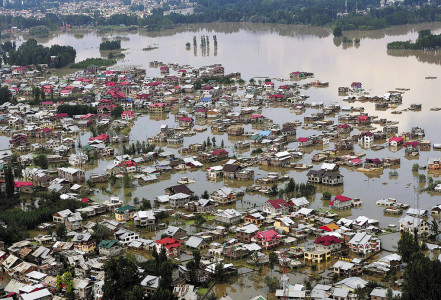
This aerial view taken Sept. 10 shows houses submerged by floodwater in Srinagar, India. While nearly 250 people have perished in the floods following rains in the Kashmir Valley in the foothills of the Himalayas, more than 700,000 people have been maroo ned on rooftops, trees and hills since Sept. 7. (CNS photo/EPA; cover photo – CNS photo/Reuters)
The missions in Kashmir are located in flood-hit Srinagar and Baramulla. In Srinagar there are two educational institutions, namely, Presentation Convent School and Burn Hall School which are submerged up to the first floor (18-20 feet). As per the last communication we had with the priests and sisters, they have taken shelter in attics of the school buildings. They still await for rescue team for evacuation, even after five days. The mission has also 32 catholic families within the vicinity of Srinagar city and they too are affected badly. As per reports coming in, the Holy Family Catholic Church located in Srinagar city also has submerged in water. There are no whereabouts of the priests residing in priest house in the church campus.”
Bishop Joseph Kopacz has approved a special collection in Brookhaven for the people of the Diocese of Jammu-Srinagar, and invites all the faithful to contribute as well. Checks can be directed to the Diocese of Jackson, PO box 2130, Jackson, MS, 39201. Please mark that the donation is for flood victims in the Diocese of Jammu- Srinagar.
Nationally, Catholic Bishops’ Conference of India has appealed to Catholics to mobilize funds and materials to augment church relief work in northern Jammu and Kashmir state, devastated by floods.
While nearly 250 people have perished in the floods following torrential rains in the Kashmir Valley in the foothills of the Himalayas, more than 700,000 people have been marooned on rooftops, trees and hills since Sept. 7.
Media reported that the casualty figures could mount as many areas have no communication links and the extent of death and devastation is not known yet. Even in the state capital, Srinagar, floodwaters had risen up to the fourth floor of buildings, and some people had to swim to safety.
The bishops’ Sept. 10 appeal expressed “sympathy and solidarity with those thousands of people who lost their homes, shelters and other establishments due to the unprecedented deluge,” the worst in 60 years.
In the appeal to the bishops and other leaders of the church, the conference president, Cardinal Baselios Thottunkal, exhorted “the community of faithful, institutions and people of good will to contribute generously to rebuild the lives of the people.”
With heavy presence of security forces in the Kashmir region plagued by Islamic militancy, security forces have been leading the evacuation of the marooned people by boat or by airlifting them.
Caritas India, social action wing of the Indian church, said people are “with no means to communicate their location to the rescuers as the power and telephone lines (including) mobile links are down for three days in a row.”
Father Frederick D’Souza, director of Caritas India, told Catholic News Service his agency also already helped 4,000 affected families.
“Five members of our emergency team are in Kashmir now assessing the situation. They are in touch with government officials to coordinate the relief work,” he said. Babita Alick, Caritas India’s team leader for disaster management, told CNS that “two Caritas staff who flew to (worst-hit) Srinagar could not move out of the airport surrounded by floodwater. They were stranded there for two days.”
“Based on results of the assessment, CRS will provide emergency relief to address priority unmet needs,” Castleman said.
(Anto Akkara of Catholic News Service contributed to this report)
(Copyright © 2014 Catholic News Service/United States Conference of Catholic Bishops. The CNS news services may not be published, broadcast, rewritten or otherwise distributed, including but not limited to, such means as framing or any other digital copying or distribution method in whole or in part, without prior written authority of Catholic News Service.)
Special Collection aids Christians in Middle East
BALTIMORE – Catholic Relief Services (CRS) has committed an initial $1 million in private funding to help victims of the escalating violence in northern Iraq. With the help of service partners in Iraq, CRS is currently providing food, water and essential living supplies to families in desperate need of the essentials.
Over the next six months, CRS hopes to more than double the initial $1 million commitment and help an additional 30,000 people with social support and trauma counseling, education for children and preparation for longer-term resettlement. The Diocese of Jackson will take up a collection the weekend of Sept. 27-28, to help Catholic agencies in the Middle East assist with humanitarian aid.
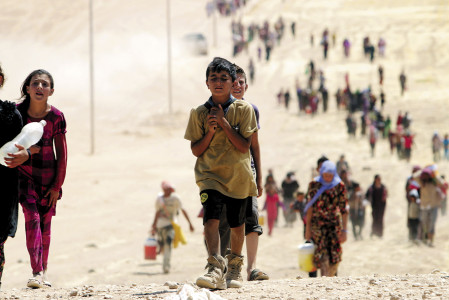
Children flee violence from forces loyal to the Islamic State in Sinjar, Iraq, Aug. 10. Islamic State militants have killed at least 500 Yezidi ethnic minorities, an Iraqi human rights minister said. (CNS photo/Rodi Said, Reuters)
CRS worker Caroline Brennan filed the following report from a refugee camp in Erbil, Iraq:
The news from Iraq can be terrifying from a distance. But up close and in person, Iraqi families could not be more gracious, welcoming and kind — despite the dire backdrop in which they are living.
In a tent where the heat is sweltering and water is in scarce supply, you are offered a bottle of cold water. Under an open sky where a family — who lived in a nice home less than a month ago, and today lives under a tree — you are graciously offered tea. Above all, you are offered apologies that they are not able to offer you anything more.
The humanitarian crisis facing Iraqi families here is something that was unimaginable for many of them just months ago. Since January of this year, 1.2 million Iraqis have been displaced within their country. They come from diverse backgrounds — Christian, Yazidi, and Shia minorities; corporate jobs, farmers and day laborers; grandparents, college students and newborns. They have one thing in common: they have been targeted by the militant group the Islamic State (also known as ISIS), and have fled their homes in fear.
Many left in the middle of the night at a moment’s notice, crowded into small cars with a large number of family members, fleeing for safer cities like Erbil and Dohuk. They made it to some form of refuge after being robbed at check points and walking for hours or days. They find themselves in a life completely foreign to what they knew before.
Local Iraqi priests say all are welcome here for refuge, but their resources are stretched thin. CRS is working with the local Catholic Church and Caritas Iraq to provide relief and care for thousands in the area. To date, Caritas Iraq and CRS have provided living supplies to 4,350 displaced families in Erbil, Ninewa, Dahuk, Zakho and Amedi. But the needs are tremendous.
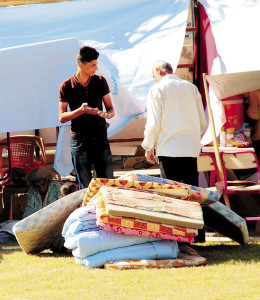
Displaced people stand outside their tent at St. Joseph Chaldean Catholic Church in Ankawa, Iraq, Aug. 14. (CNS photo/courtesy Aid to the Church in Need-USA)
Fear looms for families who are uncertain what their options will be for the long term. For starters: School is to start in September, but tens of thousands of people have filled classrooms of school buildings that were closed for the summer. Many displaced children weren’t able to take their end of year exams back home so are uncertain they will be able to move up whenever schools do resume. It’s unclear when schools will reopen and, if so, where these families will go.
“We need to go to back to our homes. We want to be safe. We want to be able to go to Church,” says Mary, who now lives in a classroom with another family in Sarsang.
And, driving along the highways, you see hundreds of families, primarily Yazidi, living under overpasses or along the sides of the road.
No matter the backdrop, you are still welcomed with kindness, and offered what little families have from their abundance of their generosity.
“I don’t want you to feel sorry for me,” said Saddam, living in an abandoned building with his six children in Erbil. “I don’t want to hurt your heart. I’m sorry you are meeting me in this circumstance. This is not life, but we are breathing,” he says.
CRS and Caritas are opening a joint office in Erbil as a base for their expanding operations. Program priorities include: Food and shelter; water and sanitation; essential living supplies; psychological and social support; education for the thousands of internally displaced children who have missed months of school; and preparation for longer-term resettlement, including more permanent shelter and livelihood options, such as cash-for-work and vocational training.
(Copyright © 2014 Catholic News Service/United States Conference of Catholic Bishops. The CNS news services may not be published, broadcast, rewritten or otherwise distributed, including but not limited to, such means as framing or any other digital copying or distribution method in whole or in part, without prior written authority of Catholic News Service.)
Pope leads global student hangout
By Carol Glatz
VATICAN CITY (CNS) — The wisdom of “It takes a village to raise a child” has been lost as kids are either overprotected by permissive parents or neglected, Pope Francis said. “The educational partnership has been broken” as families, schools and society are “no longer united together for the child,” he said Sept. 4 after holding his first Google Hangout — a live video conversation — across five continents with teenagers who belong to the international network of “Scholas occurentes,” uniting students of all faiths and cultures.
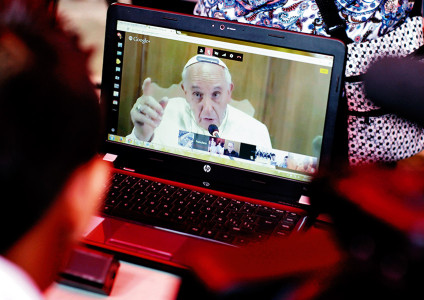
Pope Francis video chats with a Salvadoran student in the gang-infested neighborhood of La Campanera, San Salvador, Sept. 4. (CNS photo/ Jose Cabezas, Reuters)
Parents and teachers used to stick together to teach kids important values, the pope said, recalling when he got into trouble in the fourth grade. “I wasn’t respectful toward the teacher, and the teacher called my mother. My mother came, I stayed in class and the teacher stepped out, then they called for me,” he told a group of educators and experts involved with the worldwide Scholas network.
“My mom was really calm. I feared the worst,” he said. After getting him to admit to his wrongdoing, his mother told him to apologize to the teacher. The pope said he apologized and remembered “it was easy and I was happy. But there was an ‘Act Two’ when I got home,” insinuating stiffer punishment had followed.
However, today, “at least in lots of schools in my country,” if a teacher notes a problem with a student, “the next day, the mother and father denounce the teacher,” he said. The family, schools and culture have to work together for the well-being of the child, he said. People have to “rebuild this village in order to educate a child.”
All of society also needs to help children and young people who are homeless, exploited, victims of violence or without any prospects, he said. The pope pointed the blame on today’s “culture of disposal” and “the cult of money” for creating and perpetuating adults’ apathy to or complicity in the mistreatment of kids.
This is why “it’s very important to strengthen bonds: social, family and personal ties” with kids and young adults, and create an environment that helps them approach the world with “trust and serenity.” Otherwise, kids will be “left only with the path of delinquency and addiction,” he said. The pope’s comments came at the end of an afternoon encounter to launch scholas.social — a new social network for students from all over the world to cooperate on environmental and social causes, sport and art initiatives, and charitable activities.
The Scholas initiative was begun in Buenos Aires and supported by its then-Archbishop Jorge Bergoglio, who also used to teach high school when he was a young Jesuit priest. When he became pope, he asked fellow Argentine Bishop Marcelo Sanchez Sorondo, chancellor of the Pontifical Academy of Sciences, to expand the network’s reach and impact. With a small digital camera and studio lights aimed at him in the Vatican synod hall, the pope took questions from five Scholas members, who were linked in from Australia, Israel, Turkey, South Africa and El Salvador.
The pope urged the young people to build bridges through open and respectful communication, in which they listen carefully to others and exchange experiences, ideas and values.
(Copyright © 2014 Catholic News Service/United States Conference of Catholic Bishops. The CNS news services may not be published, broadcast, rewritten or otherwise distributed, including but not limited to, such means as framing or any other digital copying or distribution method in whole or in part, without prior written authority of Catholic News Service.)
Feast days set for new saints JPII, John XXIII
By Carol Glatz
VATICAN CITY (CNS) – In light of “countless requests from every part of the world,” Pope Francis has approved putting Sts. John Paul II and John XXIII on the church’s universal calendar of feast days.
Called the General Roman Calendar, it is the universal schedule of holy days and feast days for the Latin rite of the Catholic Church.
The two saints’ feast days, both of which have the ranking of an optional – not obligatory – memorial, are Oct. 11 for St. John XXIII and Oct. 22 for St. John Paul II. The Vatican newspaper, L’Osservatore Romano, published the decree Sept. 11 from the Congregation for Divine Worship and the Sacraments. The pope determines who makes the universal calendar based on recommendations from the congregation for worship.
In 2007, Pope Benedict approved stricter guidelines for determining which saints will be remembered with mandatory feast days. The new norms were necessary, the congregation had said, because the year does not have enough days to include all the saints in the universal calendar, particularly when Sundays and holy days are subtracted.
Pope Francis, who canonized the two saints in April, approved the optional memorials “given the extraordinary nature of these pontiffs in offering the clergy and the faithful a unique model of virtue and in promoting the life of Christ,” the decree said.
“Taking into consideration the countless requests from every part of the world,” the pope took “as his own the unanimous wishes of the people of God,” it said.
(Copyright © 2014 Catholic News Service/United States Conference of Catholic Bishops. The CNS news services may not be published, broadcast, rewritten or otherwise distributed, including but not limited to, such means as framing or any other digital copying or distribution method in whole or in part, without prior written authority of Catholic News Service.)
Missioners reflect as Glenmary era ends

An integrated summer camp was held outside Amory in 1974 for almost 40 at-risk children. The camp was an outgrowth of the ecumenical Three Rivers Regional Ministry (TRRM) launched by Glenmary in Mississippi in 1972. TRRM was an effort to share resources, personnel, talents, ideas and finances across parish, county and denominational borders to meet local needs. (Photo courtesy of Glenmary Challenge)
(Editor’s note: This article was reprinted from the Summer 2014 issue of Glenmary Challenge, the magazine of Glenmary Home Missioners, www.glenmary.org.)
When Glenmary missioners first arrived in West Point and New Albany, Miss, in 1965 to establish mission communities, 10 years had passed since the state’s school districts were ordered by the Supreme Court to desegregate, and the Voting Rights Act was about to be signed into law.
During that tumultuous time Fathers Joe Dean and Bob Rademacher (respective pastors of the new missions) worked to call together integrated faith communities in the heart of the national civil rights movement.
In the almost 50 years since those first missioners moved to Mississippi, Glenmary has established and/or staffed 12 missions in the state. Many of those missions were the first integrated congregations in their counties.
Missioners tried to meet the needs of all those living in the region, regardless of background, race or denomination.
In 1974 a summer camp was held for local youth near the Glenmary mission in Amory. The camp was one of the first in the state to be fully integrated.
Eventually, it evolved into Camp Glenmary, which continues to welcome campers every June. The two week of Camp Friendship are open to low-income kids in northeastern Mississippi, followed by two weeks of Catholic Camp, a time when Catholic young people from that same area gather as a group for the unique experience of not being in the minority.
Glenmary’s time in Mississippi came to an end on June 29, when the last three Glenmary missions were returned to the Diocese of Jackson: Houston Immaculate Heart of Mary, Bruce St. Luke the Evangelist and Pontotoc St. Christopher.
“As we leave the Diocese of Jackson, we rejoice that today, the Church is present in counties where our missioners have established Catholic communities, and numerous outreach programs are now in place,” says Father Chet Artysiewicz, president of Glenmary.
But, he adds, there is sadness in leaving a region that has been such an important part of Glenmary’s history as a missionary society.
The decision to move on to areas of mission need in other states is based on Glenmary’s strategic plan to consolidate mission efforts geographically, which enables missioners and lay coworkers to better collaborate and support each other.
Glenmary’s mission efforts in Mississippi were often groundbreaking in ways other than in the area of race relations.
In the early 1990s, lay professional coworkers were hired and trained by Glenmary to start Catholic communities in several states. In all, four missions were called together and established in Mississippi by lay leaders in Eupora, Ackerman, Ripley and Bruce.
Numerous outreach efforts such as sheltered workshops, day care centers and food pantries were begun by missioners and coworkers in Mississippi, with many still in existence. And Glenmary missioners and coworkers have been on the front lines in welcoming the influx of immigrants who have arrived in the state to find employment.
“As we leave Mississippi, I am heartened to see so many of our missions thriving and the members of those missions continuing on with Glenmary’s missionary charism of nurturing the faith and reaching out to those most in need,” said Father Atrysiewicz.
Rice Bowl donations at work in diocese
By Maureen Smith
Many families made the CRS Rice Bowl a part of their Lenten sacrifice, but may have forgotten to actually turn in their collections. Catholic Relief Services says it’s not too late. Rice Bowl money can be submitted until August 31. Since the beginning of CRS Rice Bowl in 1975, donations have been designated to support both local and global hunger and poverty alleviation efforts. Seventy-five percent of the revenue comes to CRS to support development projects overseas while 25 percent remains in dioceses in the U.S. to support local hunger and poverty alleviation efforts. In the Diocese of Jackson, the money is distributed out of the Catholic Charities office in Vardaman. Jettie Pettit, who runs that office, shared with Mississippi Catholic the story of one family who benefitted from the generosity of its neighbors.
On May 6, Lorenzo Villanueva came to my office asking for help to pay his electric bill. Clients must fill out a form telling us what emergency left them in need of aid. When I read his response, I asked if he would tell me his story. On February 14, he was taking his wife out to eat for Valentine’s day and to celebrate their fifth wedding anniversary.
They were also celebrating something else: His wife had had a miscarriage the second year of their marriage and was told that she would not be able to have a child because of damage to her womb. He said they had prayed for a miracle and God had blessed them by letting his wife become pregnant. On the night of their celebration, Selena was almost eight months pregnant and everything was looking good. As Villanueva pulled out from a stop sign, a speeding car ran into them on the passenger side. He was thrown from the car and suffered cuts, bruises and a broken arm. He tried to get his wife out of the car, but had to wait for the ‘jaws of life.’ At the hospital, doctors told him that Selena had no brain activity and was clinically dead. At this point, both he and I were crying.
The doctor detected a fetal heartbeat, so Selena was put on life support until the fate of the unborn child could be known. On February 16, doctors delivered five-pound-three-ounce Sofia and placed her in her father’s arms. Then, Lorenzo held his wife’s hand as the machines were turned off and she died. Sofia had to stay in the hospital for three weeks due to breathing problems while Lorenzo buried her mother and tried to alternate his time between a few hours work and many hours at the hospital. Due to hospital bills and minimum work, he got behind on his bills. Thanks to Rice Bowl funding, we were able to get him caught up on his utility bills. Father and adorable daughter are learning to go on with their lives.
Any family that wishes to make a donation to this year’s Rice Bowl collection can submit it to their parish or submit it directly to CRS and the agency will send the diocesan share to Catholic Charities. Find out more at www.crsricebowl.org.
